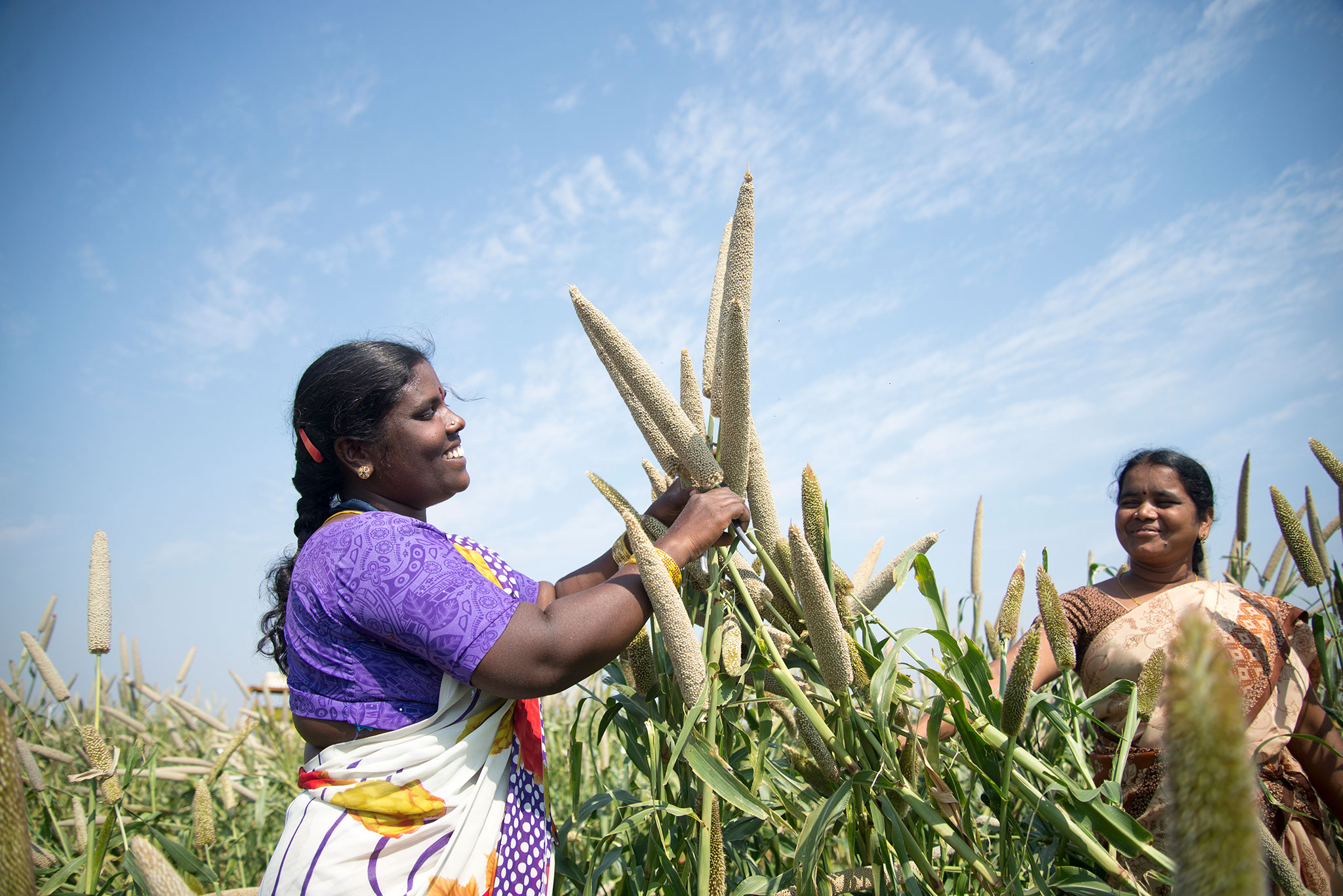Scientific name: Pennisetum glaucum.
Common name: Bajra (Hindi) Sajje (Karnataka) Kambu (Tamil) Mawele (Swahili)
ICRISAT's pioneering work on pearl millet encompasses a wide range of efforts, spanning breeding, agronomy, crop management, and addressing challenges posed by pests, diseases, and climate change. The institute has been at the forefront of genetic improvement for pearl millet, tapping into its extensive germplasm collection conserved in the Genebank to develop resistant varieties to combat downy mildew, a common disease affecting pearl millet crops.
With a strong focus on collaboration, ICRISAT has played a pivotal role in releasing 124 varieties and hybrids in 20 countries in partnership with National Agricultural Research Systems (NARS). In Asia, ICRISAT collaborates closely with the Indian National Agricultural Research System to enhance pearl millet traits of national and regional importance, providing valuable support to national breeding programs.

In West and Central Africa (WCA), the emphasis is on developing climate-smart, dual-purpose Open-Pollinated Varieties (OPVs) and hybrids tailored to diverse agro-ecologies. Working with national partners from Niger, Nigeria, Mali, Burkina Faso, and Senegal, the program focuses on breeding high grain-yielding biofortified cultivars with increased iron (Fe) and zinc (Zn) content, as well as pest and disease tolerance to combat hunger and malnutrition.
In Eastern and Southern Africa (ESA), alongside the development of improved varieties, ICRISAT actively collaborates with NARS in Kenya, Tanzania, Uganda, and Zimbabwe for germplasm collection, characterization, and testing.
To address the challenge of striga, a parasitic weed wreaking havoc on pearl millet crops, ICRISAT has successfully incorporated striga tolerance traits into breeding programs. This breakthrough has equipped farmers with cost-effective means to manage the weed and protect their yields.
Through the establishment of the Hybrid Parents Research Consortium (HPRC) for pearl millet, ICRISAT has fostered synergistic collaborations between international agricultural research centers and the private sector. More than 30 seed companies in India and abroad have partnered with ICRISAT through HPRC, enabling the delivery of improved hybrids and varieties to impoverished farmers through public-private partnerships.
As a pioneering force in genomic research, ICRISAT led the International Pearl Millet Genome Sequencing Consortium (IPMGSC), which united distinguished research institutions specializing in genome sequencing and pearl millet research. Their collaborative efforts culminated in the successful sequencing and assembly of the pearl millet genome. The publication of this valuable data in 2017 has since become an indispensable resource for researchers and breeders alike, further elevating pearl millet crops and fortifying global agricultural initiatives. ICRISAT's commitment to innovative research, collaboration, and knowledge sharing continues to be instrumental in securing the future of pearl millet as a resilient and vital crop in the fight against food insecurity and poverty in arid and semi-arid regions.
ICRISAT's breeding program is characterized by its proactive approach to continuously assess and update market segments in close consultation with various stakeholders. By understanding the needs and challenges faced by farmers, consumers, processors, and other key players along the agri-food value chain, ICRISAT can prioritize and focus on breeding traits that address current issues and align with market demands.
The Pearl Millet breeding program at ICRISAT is currently dedicated to four distinct market segments, each with specific traits targeted for improvement:
Medium to Late Maturing Dual Purpose Pearl Millet for Food and Fodder in Well-Endowed Environments:
Key Traits: Maturity duration, grain yield, stover yield, and digestibility
Focus on combating downy mildew and blast resistance
Emphasis on enriching iron and zinc levels to enhance nutritional value
Early Maturing Dual Purpose Pearl Millet for Food and Fodder in Drought-Prone Environments:
Key Traits: Maturity duration, grain yield, stover yield, and digestibility
Targeting resistance to downy mildew and blast
Developing terminal drought tolerance for enhanced resilience
Working to boost iron and zinc levels for improved nutrition
Dual Purpose Pearl Millet for Heat Stress Environments:
Key Traits: Maturity duration, grain yield, stover yield, and digestibility
Efforts to ensure resistance against downy mildew and blast
Focusing on flowering stage heat tolerance to withstand heat stress
Enhancing iron and zinc levels to elevate nutritional content
High Biomass Pearl Millet for Forage:
Key Traits: Maturity duration, forage yield, and digestibility
Striving for increased tillering and resistance to downy mildew and blast
Offering single cut and multi-cut options for flexibility
Exploring ways to elevate protein content in forage for better livestock nutrition
These market-focused breeding efforts demonstrate ICRISAT's commitment to addressing diverse challenges and catering to the specific needs of various agro-climatic regions. By developing improved pearl millet varieties tailored to each market segment, ICRISAT aims to contribute significantly to food security, sustainable agriculture, and poverty alleviation in regions facing climatic challenges. Through continued collaboration and research, ICRISAT remains at the forefront of enhancing pearl millet's impact on livelihoods and agriculture in arid and semi-arid regions worldwide.
Should you have any questions our dedicated support team is ready to help. Please email: research@icrisat.org